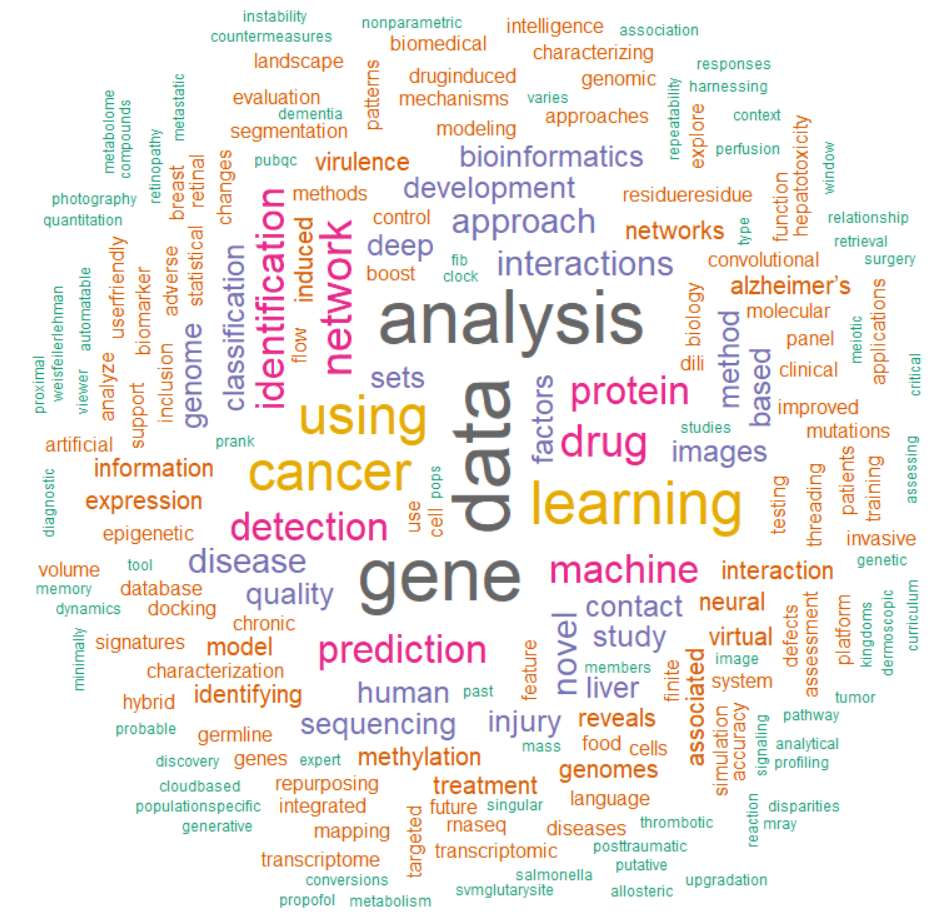The original application of informatics in medicine was developing electronic health records and expert systems and enabling the use of data from across multiple systems to assist with research, clinical decision making and patient care.
 “The field of informatics has evolved immensely from its original use,” said Jake Chen, Ph.D., Chief Bioinformatics Officer at the UAB Department of Biomedical Informatics and Data Science (DBIDS). “The next step in the evolution of informatics is the collaboration with precision medicine to solve complex clinical and treatment issues facing patients today. This collaboration is about using genomic information and data-driven informatics to build new analytic engines, or the ‘brain,’ of future healthcare,” Chen explained.
“The field of informatics has evolved immensely from its original use,” said Jake Chen, Ph.D., Chief Bioinformatics Officer at the UAB Department of Biomedical Informatics and Data Science (DBIDS). “The next step in the evolution of informatics is the collaboration with precision medicine to solve complex clinical and treatment issues facing patients today. This collaboration is about using genomic information and data-driven informatics to build new analytic engines, or the ‘brain,’ of future healthcare,” Chen explained.
DBIDS recently hosted the 16th Annual Conference of the Midsouth Computational Biology and Bioinformatics Society, where this year’s theme was “Informatics for Precision Medicine.” Dr. Chen served as the general chair for the conference and stated that this is the first national conference to explore the confluence or nexus of informatics and precision medicine. The  presentations at this year’s meeting showed the potential synergy between these two fields. “This is all about using genetic and genomic data, advanced analytics, and machine learning to solve diagnosis and treatment problems for diseases such as cancer,” Chen said during his opening remarks at the conference.
presentations at this year’s meeting showed the potential synergy between these two fields. “This is all about using genetic and genomic data, advanced analytics, and machine learning to solve diagnosis and treatment problems for diseases such as cancer,” Chen said during his opening remarks at the conference.
More than 160 bioinformaticians and computational biologists attended the conference, with nearly 40 of the attendees being graduate trainees or postdoctoral fellows. The attendees came from 18 states and 36 academic institutions around the Midsouth, a region traditionally underrepresented in national discussions of bioinformatics research and translational science.
The conference program featured four keynote talks, 58 podium presentations, 37 poster presentations, three career development events for students, an expert panel, and a roundtable discussion. It also offered two tutorials on single-cell genomics and metabolomics. The program was jointly developed by Dr. Chen and Weida Tong, Ph.D., director of Bioinformatics at the Food and Drug Administration (FDA) National Center for Toxicological Research in Jefferson, Arkansas. The podium presentations consisted of 13 sessions across seven tracks ranging from clinical genomics to emerging technologies. The student career development events included a workshop, a mentoring session, and a Young Scientist Excellence Awards program.
The keynote talks represented a broad spectrum of informatics expertise, including machine learning, genome informatics, translational bioinformatics and clinical genomics.
Predrag Radivojac, Ph.D., professor of Computer Science at Northeastern University, delivered the first keynote talk on the use of semi-supervising machine learning to help understand the functions of coding variants of personal genomes. Radivojac explained, “The key to precision medicine is to develop methods for accurate estimation of the frequency of occurrence of hard-to-measure and rare genetic events.”
The second keynote talk was presented by Mark Gerstein, Ph.D., professor of Biochemistry and Computer Science at Yale University. Gerstein described late-breaking results from the PsychENCODE Consortium, a comprehensive National Institute of Health-funded project, that resulted in sequencing 1866 adult brains for genetic variants implicated in psychiatric disorders. He showed a bedazzling array of genetic resources, tools and data sets created to improve psychiatric disorder prediction by six-fold compared to the more common approach of using polygenic risk scores alone. “To me, precision medicine lies in collecting pieces of these genetic variation data and assembling them into gene networks, pathways and interpretable deep-learning models,” said Gerstein.
King Jordan, Ph.D., director of Bioinformatics Graduate Program at the Georgia Institute of Technology, delivered the third keynote titled, “Genomic medicine for understudied populations: lessons from Colombia.” Jordan discussed his experience building a genomic medicine research team in Colombia over the past decade, with the goal of better understanding of how genetic and environmental factors interplay in the real world to affect type-2 diabetes outcomes. “To translate genomic knowledge into practice, you need to re-interpret genomic and pharmacogenomic variations in the context of the new population,” explained Jordan. “Additional data about the socioeconomic, environmental and behavioral health of the population should be collected and characterized.”
The final keynote talk was delivered by Josh Peterson, M.D., director of the Clinical Informatics Program at Vanderbilt University Medical Center, on clinical applications of genomic medicine. Citing his experience with the NIH-funded eMERGE (Electronic Medical Records and Genomics) project, as well as the PREDICT and IGNITE 2 projects, for which he served leading informatics roles, Peterson thinks future progress must be made “to deliver evidence-based and patient context sensitive recommendations for treatment or further screening once genetic risks are identified.” Otherwise, he predicted that clinical genomic implementations may be stalled.
A new component of the conference was the use of social media to create a digital conversation with the #MCBIOS19 hashtag on Twitter. The program of events was made electronic this year with the mobile app, Meeting Application. Attendees could look up session times and locations in the app and discuss their thoughts and insights with other participants on the app’s feedwall. Many of the attendees found the conference to be a huge success and an overwhelming majority found the theme for this year’s conference to be interesting and engaging.
The conference was co-sponsored by the UAB Heersink School of Medicine, the UAB Department of Biomedical Informatics and Data Science, the O’Neal Comprehensive Cancer Center at UAB, the Center for Clinical and Translational Sciences, the Hugh Kaul Precision Medicine Institute and various other co-sponsors.
At the conference, Dr. Chen was elected the next president of MCBIOS. He will serve as president-elect until his term begins in 2022. MCBIOS 2020 will be held at the SAS Institute in Cary, North Carolina.
"DBIDS is doing its part to bring informatics and precision medicine together. We are developing tools to increase access to biological and patient data to help with computational solutions to biomedical problems,” James Cimino, M.D., chair of the Department of Biomedical Informatics and Data Science, explained. “We are also developing a new platform called U-BRITE, which supports translational team science across the spectrum from genetic sequencing to population health.” U-BRITE stands for UAB Biomedical Research Information Technology Enhancement and was designed to remove the issue of scientific data silos by providing a virtual sandbox and tools for researchers with large and/or complex data sets to collaborate. The institute is working to launch the next version, U-BRITE 2.0, in hopes of expanding the scope and scale of available data and enhancing the expertise of UAB’s research teams.
For inquiries about how to participate in U-BRITE projects, contact Jake Chen at jakechen@uab.edu or visit ubrite.informatics.uab.edu/.